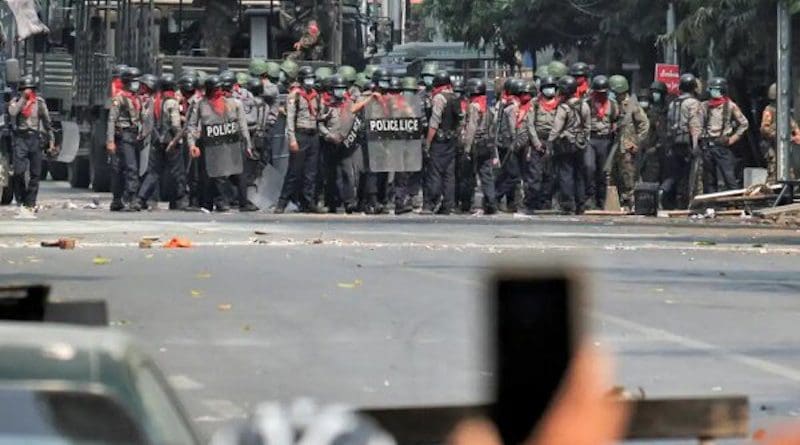Myanmar’s Brutal Civil War Must Not Be Ignored – OpEd
By Arab News
By Dr. Azeem Ibrahim*
The viciousness of the civil war in Myanmar is strong enough to take the breath away — if only the world would pay attention.
Recent reporting from The Times describes a hellish conflict, in which the soldiers of the military government patrol rebelling areas of the country from helicopters, shooting down at helpless children.
This is part of the landscape of a conflict that has become savage and cruel, largely out of sight of the international community.
Since the coup against the mixed-democratic and army government in 2021, Myanmar’s military has been back in control. It has fought a multifaceted civil war ever since: Against ethnic groups on which it has perpetrated genocide in the past, along with remnants of the old democratic opposition, which has reorganized on armed lines, behind a national unity government and its armed forces, the People’s Defense Force.
International media is severely restricted within Myanmar. For such a large country, the outside world is badly connected to what happens there and to its people. Major reporting, in the line of The Times investigation, is significant news.
That investigation described an attack on a school in Tabayin, within Sagaing, a region in Myanmar’s northwest. It began with military helicopters firing their rockets at the building and accompanying monastery, in whose grounds the school lay. This was followed by a ground attack: Two transport helicopters, filled with 80 men, touched down. The men piled out of their transport and stormed inside the buildings, shooting at the children and monks, who attempted to hide. “By the time the raid was complete,” The Times reported, “between six and 11 children, plus several adults, were dead, according to witnesses, while many survivors suffered terrible injuries.”
This is only a small microcosm of a terrible and under-heeded war.
The newspaper describes a strategy in which the military seeks to use its technological advantages — including Russian-produced aircraft — to overwhelm both guerrilla fighters and the civilian populations they live among. This is a conscious strategy that is notably cruel.
“The generals increasingly favor attacks from above, predominantly with weaponry bought from Russia, the regime’s most enthusiastic backer. Nearly 140 such attacks have been reported and the number of strikes has increased steadily since September, passing more than one a day last month,” The Times noted, quoting a report from Myanmar Witness, an advocacy group.
Other attacks on civilians in the Sagaing region have taken their toll and strikes have included an attack on a concert that left dozens dead. The report from Myanmar Witness counted 135 airstrikes taking place over the past six months.
This is an asymmetric way of waging war; one that prioritizes the soldiers making the attack over the civilians they are likely to kill.
This is no problem for the junta, given that many of the civilians are not from the Burman ethnic majority and are instead Kachin and from other ethnic groups, against which the military has pursued decades-long campaigns of marginalization and violence, ever since the foundation of the state.
The conduct of this war is not something widely discussed internationally. Many within Asia consider the war a question for Myanmar, to be worked out by the factions there, and not worth major campaigning or even paying attention to.
But the conduct of this war has effects even beyond the suffering it creates. Violent civil conflicts tend to spill over into other areas. They proliferate weapons and military training. If armed groups fighting in Myanmar are forced from the country, they will carry on their struggles from elsewhere.
And if Myanmar’s ethnic minorities believe they are being subjected to genocide within Myanmar, they will not stop fighting the regime there, no matter how limited their supplies of arms or international support.
One option — not a solution, but a necessary precondition for a solution — is open to the international community: The continued investigation of the junta’s past conduct, notably regarding the Rohingya minority, which has been subjected to genocide for the past decade.
The treatment of the Rohingya in many ways preceded the civil conflict we now see. Investigating it will teach the world lessons, and the search for justice there will lead to the bringing to justice of military figures who have committed or will commit other crimes.
If nothing else, the world must learn to pay attention to this most violent of civil conflicts. Or else crimes will be committed in silence and nothing will be done to bring the criminals to a just end.
• Dr. Azeem Ibrahim is director of special initiatives at the Newlines Institute for Strategy and Policy in Washington D.C. and the author of “The Rohingyas: Inside Myanmar’s Genocide” (Hurst, 2017).

